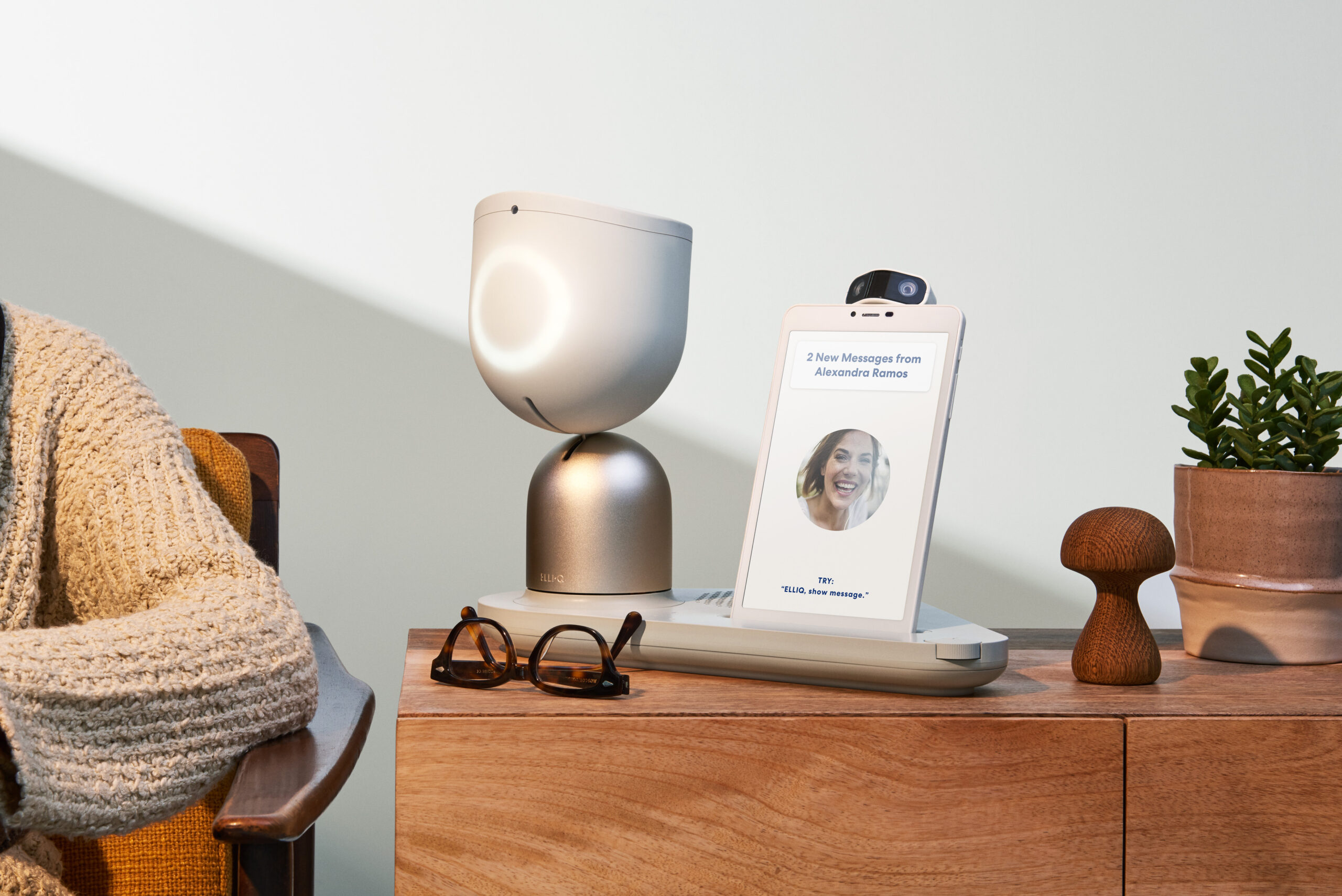
Powered by AI, ElliQ is a voice-operated robotic care companion designed to foster independence and provide support for older adults.
About 1 in 4 adults 65 and older are considered to be socially isolated, putting them at increased risk for a wide range of health conditions, from dementia to heart disease and stroke. Many don’t have family and friends who live nearby or visit regularly; and the number of professional caregivers is failing to keep up with demand as the U.S. population ages.
Responding to the need, the New York State Office for the Aging announced Wednesday that it is partnering with Intuition Robotics to bring an AI robotic care companion into the homes of 800 older adults as part of the state’s efforts to battle social isolation and support aging in place. NYSOFA is working with local offices for the aging and other partners to identify older adults who would most benefit from ElliQ by Intuition Robotics, which the Israeli company describes as first-ever proactive and empathetic AI robotic care companion.

With the Rise of AI, What IP Disputes in Healthcare Are Likely to Emerge?
Munck Wilson Mandala Partner Greg Howison shared his perspective on some of the legal ramifications around AI, IP, connected devices and the data they generate, in response to emailed questions.
The robotic care companion is made up of two parts: a “head” that moves and a touchscreen tablet. Both are attached to a single base. The head has a lamp-like “face” with microphone and speakers; when it’s talking to someone, it lights up and swivels to face that person. The tablet is used to display pictures and features and conduct video calls.
ElliQ was launched commercially in March in the U.S. after years of pilots and early production deployments.
“This partnership is just the start of our work with local and federal governments and public sector partners,” said Dor Skuler, CEO and co-founder of Intuition Robotics, in an email. “New York State is an innovator when it comes to technological solutions for aging, and we’re excited for them to start this first-of-its-kind of pilot program with ElliQ.”
As with other AI, the technology aims to help people, not replace them. But ElliQ is also built to be interactive and even personable. The AI care companion, which is small enough to be perched on a person’s dresser, doesn’t just react but chimes in with things like a reminder to take medications—or a joke.
“As much as we all want to be there for family members and friends as they age, it’s not possible all of the time for a majority of people,” Skuler said. “We also know there’s a caregiver crisis.”
It’s projected that a national shortage of 151,000 caregivers will exist by 2030 and it will increase to a 355,000-caregiver shortfall by 2040 in the U.S., according to a report from the Global Coalition on Aging and Home Instead.
“We want ElliQ to fill in the gaps when human companionship isn’t available as often as we’d like,” Skuler said.
However, ElliQ isn’t made to look like a person.
“The design is intended to prevent people from mistaking ElliQ for a human, but the AI and conversational features give it just enough personality that people are comfortable talking and connecting with it,” Skuler said. In addition, “ElliQ facilitates texting or calling or making plans with family and friends. No AI or technology can truly replace human companionship.”
Skuler said the company doesn’t have any “true competitors that have the same level of proactive AI and empathetic companionship.”
There are other digital assistants on the market, such as Amazon Alexa products and Google Nest. But they don’t have the proactive AI capabilities of ElliQ, he said. Skuler emphasized that ElliQ is designed specifically for older adults with input from people 65 and older.
“There are other age tech companies creating great solutions specifically for seniors, too. GrandPad created a simplified tablet for seniors. Ageless Innovation created robotic pets,” he said.
But Skuler believes ElliQ differentiates itself from those other products by providing more functions and features for users, and personalizing its suggestions and conversations. Intuition Robotics’ primary customers are people aged 65 and older who are living at home alone or spend most of their time at home.
The price for ElliQ starts at $29.99 per month for a subscription (with an annual plan) that includes unlimited use of the hardware and software. There’s also a $249.99 enrollment fee that includes account setup and installation support.
NYSOFA is spending $700,000 to provide access to ElliQ for 800 older adults.
“This product does so many things to improve health, combat isolation, and improve overall well-being and independence,” said Greg Olsen, director of NYSOFA, in a statement. “Despite misconceptions and generalizations, older adults embrace new technology, especially when they see it is designed by older adults to meet their needs. For those who experience some form of isolation and wish to age in place, ElliQ is a powerful complement to traditional forms of social interaction and support from professional or family caregivers.”
Photo: Intuition Robotics














